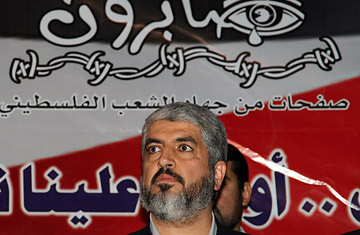
Hamas leader Khaled Meshaal
(2 of 2)
To make a positive case for easing the boycott of Hamas, you have to believe that through negotiation the group can change — that it can moderate both its goals and the means it uses to achieve them. Ironically, the Israeli government once considered Hamas quite moderate. In the late 1980s, when the Israelis were primarily concerned with Arafat's secular-nationalist terrorism, they allowed Hamas to hold rallies and appear on television, even as they banned the PLO. So if Hamas, in Israel's view, was moderate once, could it moderate itself again? The group's founding charter — which brims with anti-Semitism and rules out conceding any historically Palestinian land — doesn't exactly fill one with hope. On the other hand, Hamas' leader in Damascus, Khaled Mashaal, declared a couple of years ago, "I speak of a Palestinian and Arab demand for a state on 1967 borders. It is true that in reality there will be an entity or a state called Israel on the rest of Palestinian land." Ephraim Halevy, a former head of Israel's national intelligence agency, the Mossad, thinks Hamas' leaders understand that their "ideological goal is not attainable and will not be in the foreseeable future."
Is he right? If you bring Hamas into the political process and it acquiesces in a peace deal, will it abandon its dreams of eradicating Israel or not? Will Palestinian statehood moderate Hamas — by making it invested in the status quo — or — simply whet its appetite for more?
We can't know, but for now, it's best to stop worrying so much about what Hamas says and try to create a situation in which we can better influence what it does. That doesn't require any handshakes between Americans, Israelis and Hamas on the White House lawn. What it requires is this: at some point, Fatah and Hamas will probably form another national-unity government, which is what the Palestinian people badly want. In some form or another, that government will most likely include Hamas ministers. America should ignore them, just as we ignore the Hizballah ministers in the Lebanese government. But we should keep dealing with Abbas and the other non-Hamas types. This will do two things. First, it will allow commerce to start flowing into Gaza, since technically the strip won't be under Hamas' control. In practice, of course, Hamas will help decide how the money is spent. But lifting the Israeli blockade — along with doing more to stop the smuggling of rockets into Gaza and returning kidnapped Israeli soldier Gilad Shalit — is crucial to getting a real, long-term cease-fire between Israel and Hamas. Once Gaza's reconstruction begins, Hamas will have an incentive not to provoke Israel and blow up the entire process. The happier Palestinians are with what they have, the harder it will be for Hamas to jeopardize that in the name of a kamikaze mission to wipe Israel off the map.
If the U.S. pursues this path, Netanyahu may grumble. But a full two-thirds of Israelis think their own leaders should talk to a Palestinian unity government that includes Hamas. After all, what is the alternative? Trying to keep the Palestinians divided when their people desperately want unity? That will only make Abbas look like a U.S. and Israeli stooge; keep Gaza a festering, terrorism-breeding hellhole; destroy much of Barack Obama's goodwill in the Muslim world; and foster war between Hamas and Fatah, and Hamas and Israel.
I don't need any lectures on the evil of Hamas: 13 years ago, the organization blew up a Jerusalem bus carrying one of my friends. But sooner or later, America and Israel will have to start dealing with a Palestinian government that includes it for the same reason the U.S. is dealing with an Iraqi government that includes Baathists and is trying to broker an Afghan government that includes the Taliban — because it's our best shot at getting terrorists out of the terrorism business. If there were an easier way, we'd have found it by now.
